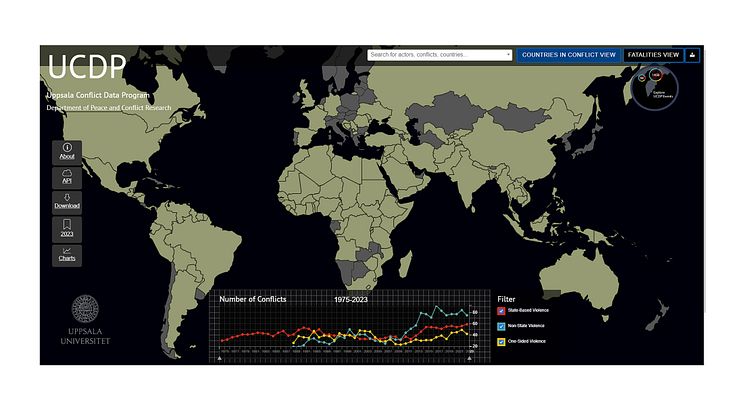Press release -
UCDP: fatalities in organised violence still decreasing
New data from the Uppsala Conflict Data Program (UCDP), Uppsala University shows that the number of fatalities in organised violence decreased for the third consecutive year. In 2017, almost 90,000 deaths were recorded by UCDP, a decrease of 32% compared to the latest peak in 2014. The most significant drop took place in Syria.
The past five years have witnessed high levels of fatalities compared to most years since the end of the Cold War. The wars in Syria have driven this trend.
“However, one should remember that the wars of the 21st century have been nowhere near as lethal as the large-scale wars of the 20th century, including Korea, Vietnam and the both world wars” says Therése Pettersson, project leader at the UCDP, Department of Peace and Conflict Research, Uppsala University. “This long-term trend towards a more peaceful world holds even more strongly when controlling for increases in world population during this time period”, Pettersson clarifies.
In addition, the number of conflicts involving the state decreased, from 53 conflicts 2016 to 49 in 2017. The group known as the Islamic State (IS) has dominated the picture lately, and the group was challenging 15 different governments around the world during 2017. This is the highest number since IS announced its caliphate in 2014. They also fought against numerous different rebel groups as well as targeted civilians. Both Syria and Iraq launched large-scale offensives to defeat the group and by the end of 2017, IS had lost most of its territory in the region.
“This does not mean that the group is crushed”, warns Therése Pettersson. “IS groups have established themselves in many countries of the world and they continue to constitute a serious threat to people. One example comes from the Philippines, where an IS group attacked Marawi City in May 2017. The five-month siege resulted in over one thousand fatalities”.
Experts have warned that attacks against civilians, including terror attacks, may increase when IS is weakened. So far, however, the data from UCDP do not seem to support this forecast.
“Even if IS is the group targeting most civilians, the total number of victims in their attacks decreased in 2017 compared to in 2016”, says Pettersson.
Regarding conflicts between non-state groups – such as rebel groups or ethnic groups – the development in Africa has been worrying, Central African Republic and DR Congo in particular. UCDP registered the highest number of non-state conflict in the world during the entire 1989-2017 period, 82 non-state conflicts in 2107. Fifty of these took place in Africa.
The results presented in the press release will be published in the Journal of Peace Research.
http://journals.sagepub.com/doi/full/10.1177/0022343318784101, DOI: 10.1177/0022343318784101,
For more information, please contact:
Project manager Therése Pettersson, UCDP, Department of Peace and Conflict Research, Uppsala University, Sweden. Phone: +4670-6496491 Email: therese.pettersson@pcr.uu.se
Topics
Uppsala University -- quality, knowledge, and creativity since 1477
World-class research and outstanding education of global benefit to society, business, and culture.
Uppsala University is one of northern Europe's highest ranked academic institutions. www.uu.se

